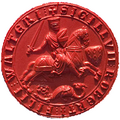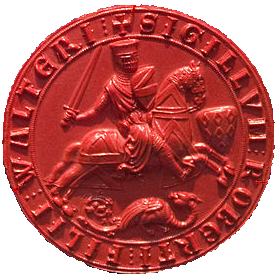English: Seal of Robert FitzWalter (d.1235). Modern impression from original silver die. (Adaptation from
File:Britishmuseumrobertfitzwalterseal.jpg) British Museum catalogue no: 1841,0624.1
See BM database entry for more details
Description from BM catalogue: "Circular silver seal-matrix with a ridge at the back, of semi-circular section, pointed at the bottom end, at the upper edge in a loop with a collar of beaded work immediately below it. An armed knight with a sword in his right hand is shown on horseback with coif, hauberk, chausées of mail, surcoat and a flat-topped helmet with the visor down. Guarding his breast is a shield of arms, a fess between two chevrons (Fitzwalter). The horse is also caparisoned with these arms and wearing a diapered head cloth. In front of the horse is another shield of arms, seven mascles (De Quincy). Below, a dragon regardant with floriated tail. Legend, within pearled borders. Dimensions: Diameter: 7.35 centimetres". The arms on the shield in front (Gules, seven mascles or 3,3,1) are for w:Saer de Quincy, 1st Earl of Winchester, his half-first cousin and ally, as the paternal grandfathers of both were successively married to Matilda/Maud de Senlis/St Liz.
Curator's comments
Text from 'Good Impressions: Image and Authority in Medieval Seals', ed. Adams, Cherry and Robinson. British Museum 2008. Handlist no. 8.1. Seal of Robert Fitzwalter Robert Fitzwalter, shown fighting a dragon, was one of the barons who made King John attach his seal to Magna Carta. The shield of arms placed close to his horse belonged to his allies, the de Quincy family.
Text from 'Catalogue of British Seal-Dies in the British Museum', A.B. Tonnochy, London 1952, cat. no. 332. Found in the reign of Charles II at Stamford, Lincolnshire. B.M. 'Cat. of Seals', no. 6016; 'Archaeologia', v. p.211.

